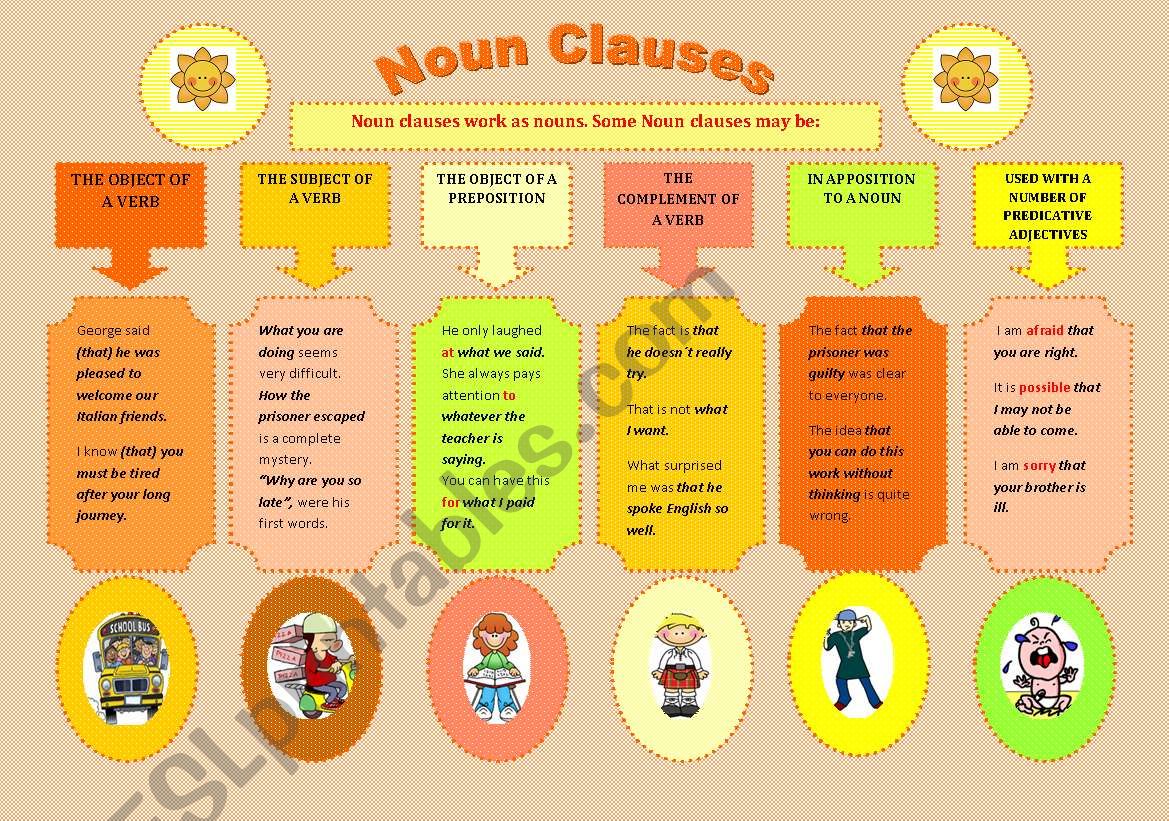What Is Noun Clause / Noun Clause With Sentences English Phrases Learn English Vocabulary Transition Words And Phrases
What Is Noun Clause / Noun Clause With Sentences English Phrases Learn English Vocabulary Transition Words And Phrases. Whatever, whichever, whoever, whomever, how, what, when which, whether, whom, who, why at the beginning. Noun clauses begin with words such as how, that, what, whatever, when, where, whether, which, whichever, who, whoever, whom, whomever , and why. A clause is a group of words containing a subject and a verb. Noun clauses come after the words such as how, that, what, whatever, when, where, whether, which, whichever, who, whoever, whom, whomever, and why. It follows a linking or copular verb to describe or modify the subject of the sentence.
A noun clause can function as what you have done pleased so many fans. We studied that depend or subordinate clauses are subdivided into three parts: It works as a noun in a sentence. What is a noun clause? Uses and structures of noun clauses along with illustrations.

Whether he will attend or not.
A noun clause is a dependent clause that contains a subject and a verb. A clause is a group of words that forms part of a sentence and that contains a subject and a predicate. Noun clauses can play the role of. The verb in a clause can be finite use this pan for the pasta. How, that, what, whatever, when, where, whether, which, whichever, who, whoever, whom, whomever, and why. The two forms of noun clauses in the english language are finite noun clauses and nonfinite noun clauses. Like all clauses, a noun clause has a subject and a verb. Noun clauses can act as subjects, direct objects, indirect objects, predicate nominatives. Noun clauses generally begin with words such as how, that, what, whatever, when, where, whether, which, whichever, who, whoever, whom, whomever, and why. The noun clause is a clause that functions like a noun in the sentence. A noun clause (also called nominal clause ) is a dependent clause that plays the role of a noun. Whatever, whichever, whoever, whomever, how, what, when which, whether, whom, who, why at the beginning. Noun clauses come after the words such as how, that, what, whatever, when, where, whether, which, whichever, who, whoever, whom, whomever, and why.
A noun clause is a dependent clause that contains a subject and a verb. Noun clauses are a type of subordinate clause. Remember that a noun names a person, place, thing, or idea. It works as a noun in a sentence. A noun clause functions as a noun in a sentence.

A noun clause is a dependent clause that contains a subject and a verb.
A noun clause is a dependent clause that functions as a noun. Uses and structures of noun clauses along with illustrations. What i had forgotten was that i had a test today. As a noun clause does the work of a noun, it can be subject to a sentence, object of a transitive verb, object of a preposition, apposition to a noun, or complement to a linking verb. English easy learning grammarsentences and clausesa clause is a group of words which contains a verb. It works as a noun in a sentence. It can be used as the subject, direct object, indirect object, object of a preposition, subject complement, or appositive. We already have talked about independent and dependent clauses. A noun clause cannot stand alone because it is not a complete thought. What is noun clause, example sentences It is a direct object in this sentence. Just like nouns do, a noun clause names people, things noun clauses have words like; Noun clauses generally begin with words such as how, that, what, whatever, when, where, whether, which, whichever, who, whoever, whom, whomever, and why.
…what you have learned. this clause is a noun clause. I'm elizabeth o'brien, and my goal is to get you jazzed about grammar. Noun clauses can function as subjects, objects, or complements. Having trouble finding the subject or object in a sentence? The two forms of noun clauses in the english language are finite noun clauses and nonfinite noun clauses.

= subject complement of 'uncertainty' describing what is uncertain.
Remember, because a noun clause is a clause, you should be able to find both a subject and a verb. English easy learning grammarsentences and clausesa clause is a group of words which contains a verb. A noun is the name of a person, place, thing, or idea. Noun clauses can function as subjects, objects, or complements. I'm elizabeth o'brien, and my goal is to get you jazzed about grammar. It can be the subject of a sentence, an object, or a complement. This page has lots of examples of noun clauses and an interactive exercise. A noun clause functions as noun in a sentence. A noun clause is a subordinate clause in a complex sentence that acts as a noun. The verb in a clause can be finite use this pan for the pasta. It might be a noun clause. A noun clause is a dependent clause that functions as a noun. Noun clauses can play the role of.
Post a Comment for "What Is Noun Clause / Noun Clause With Sentences English Phrases Learn English Vocabulary Transition Words And Phrases"